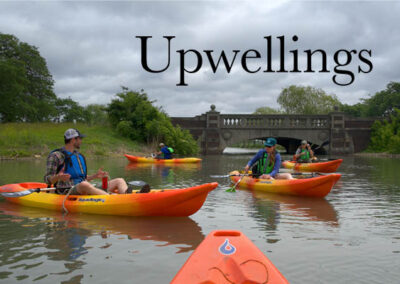From testing underwater robots to leading trash clean-ups on Belle Isle, Michigan Sea Grant’s interns had a busy summer.
Michigan Sea Grant’s undergraduate environmental internship program coordinates and funds students working on summer Great Lakes stewardship projects. For each internship, a student works with an academic institution, business, nonprofit, or government agency that helps support and guide the project.
In 2021, the program’s third year, Michigan Sea Grant supported 13 interns, representing 8 colleges and universities. Their projects spanned the state, and efforts ranged from creating educational signs about contaminated wetlands with the Upper Peninsula’s Keweenaw Bay Indian Community to surveying trees on Wayne State University’s campus in Detroit.
Several of the interns wrote blog posts about their summer work. Read about Cynthia Gutierrez Navarro’s experiences while sampling Lake St. Clair’s bioswales, or Rachel London’s surprising roadblock while collecting smallmouth bass.
The interns also showcased their projects during a virtual symposium on August 18. Each intern delivered a brief presentation about their work and answered questions from the audience. A recording of the symposium is available online; timestamps in the video description jump to specific portions of the agenda.
During their presentations, some of the interns noted that their summer experiences helped change the trajectory of their future careers. Rachel London, a student at Michigan State University, partnered with the Michigan DNR to investigate potential causes of skin lesions in smallmouth bass.
“I’ve always dreamed of becoming a veterinarian,” Rachel reflected in her presentation. “However, I always imagined myself working with cute, fluffy puppies and kittens. Since this internship I’ve completely changed my vision for myself. I want to be in the field, working with fish and wildlife, studying animal health, alongside respected, knowledgeable individuals who strive to do their best for the benefit of animals.”
Other interns plan to weave their summer projects into their schoolwork. Cheyenne Wilcox from Oakland University also worked with the Michigan DNR, studying smallmouth bass recapture data around Lake Michigan’s rocky reefs.
“Working with the DNR has been a truly wonderful experience and has given me a better idea of what I would like to do for my career after I graduate in the spring,” Cheyenne said during the symposium. “I plan to continue this research to the end of summer and into my fall semester, for my environmental science internship class. I hope I can continue to collaborate with the remarkable team at the DNR, and maybe one day join their team full time.”
For many of the interns, these summer projects were rich with new partnerships and connections. “It was incredible to be able to go to Detroit a couple of times a week and meet with different community groups and spend some time experiencing nature and the environment from the perspective of people who don’t have a science background,” said Gabrielle DeMott, a University of Michigan student who worked with the Detroit Zoological Society on a variety of outdoor education opportunities. “I got to experience their passion and their excitement for the things that we were doing. It was really, really rewarding, and it’s something that I want to continue to do in my career.”
The application window for 2022 summer funding will open later in 2021. Watch Michigan Sea Grant’s social media feeds or internship webpage for more information.




